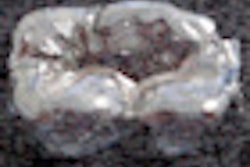Yu Zhang, PhD, an associate professor of biomaterials and biomimetics at the New York University (NYU)College of Dentistry, has been awarded a five-year, $1.9 million grant from the National Institute of Dental and Craniofacial Research to develop and test a prototype glass-zirconia composite dental crown.
The award enables Zhang to advance earlier research on a glass-zirconia composite formulation intended to serve as an alternative to porcelain-veneered zirconia designs, according to the university.
"A composite crown with glass-rich surfaces will be less susceptible to top-to-bottom fractures from direct contact with hard food, as well as to ruptures that occur when the bottom of the restoration buckles under pressure," Zhang stated in a press release.
He formulated the initial prototype glass-zirconia composite material with funding from the National Institutes of Health and the National Science Foundation, which awarded him more than $1.4 million in 2007 and 2008, respectively. His prior research showed that the glass-zirconia composite has significantly higher load-bearing capacity than porcelain-veneered zirconia formulations.
"In this new study, we will be using a mouth motion simulator to compare the fracture-resistance of eight glass-zirconia and eight all-zirconia crowns," Zhang said. "Each crown will endure two months and 1.25 million chewing cycles in the simulator -- equivalent to three meals a day over a five-year period."
Zhang's glass-ceramic composite crown design has a predominantly glass surface with underlying layers that gradually become more densely packed with ceramic. The crown offers aesthetics comparable to a porcelain-veneered zirconia version, but since it is thinner, less healthy tooth structure needs to be removed to make room for it.
If the glass-ceramic composite crown proves more durable than the all-ceramic variant, Zhang plans to conduct a subsequent study examining the safety and efficacy of glass-ceramic crowns in human subjects.



















